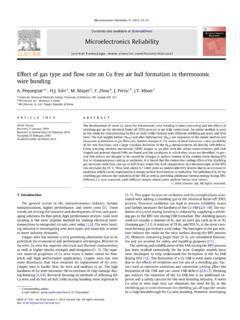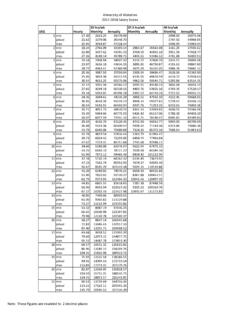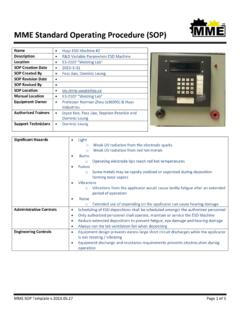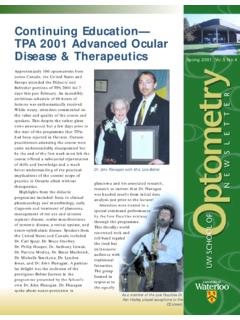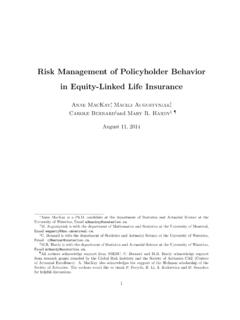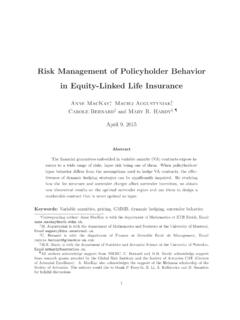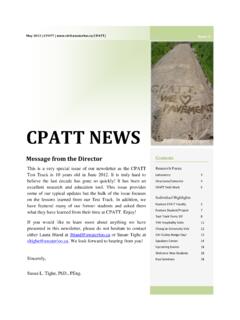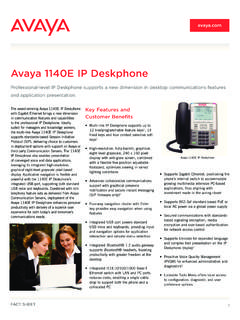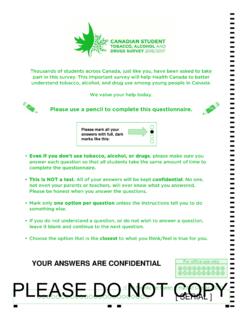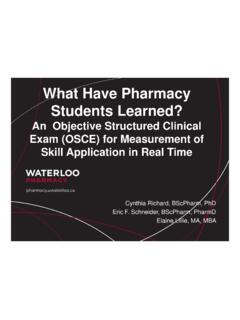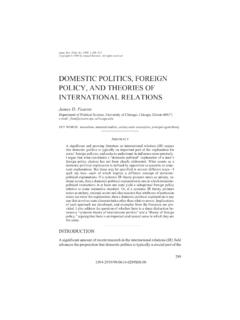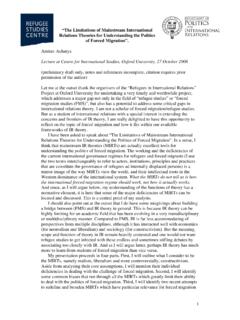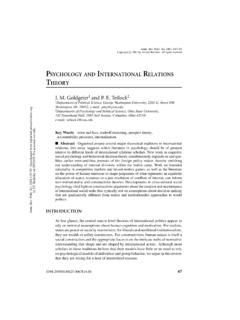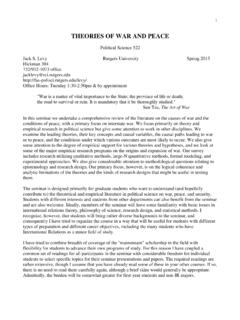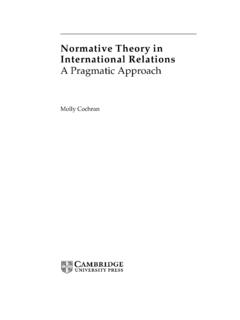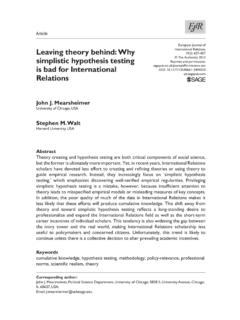Transcription of PSCI 487: International Relations Theory
1 Page 1 of 11 psci 487 : International Relations Theory Fall 2013 AL 210, Thursdays, 1:30-4:20 Instructor: Dr. William Flanik Email Address: Office Location: Hagey Hall 351 Office Hours: Thursdays, 4:30-6:00 PM or by appointment Contact Policy: I ll respond to emails within 24 hours (48 hours on weekends). When appropriate, I ll ask that we meet during office hours. If you can t come to my regularly scheduled office hours, contact me to arrange a meeting before class on Thursdays. Course Description: This course surveys most of the major schools of International Relations (IR) Theory . During our theoretical investigations, we ll explore issues of gender, militarism, International conflict and cooperation, global political economy, and foreign policymaking.
2 To acquaint you with the breadth of the field, we ll give equal attention to positivist and post-positivist theories. The course considers the following questions: Who are the key actors in world politics? How do they understand themselves, their world, and moral action within it? What do they want? How do these actors make decisions? Where, how, and why do they interact? What systems emerge from their interaction, and how do those systems shape actors characteristics, decisions, and behavior? Is IR a science, and what does it mean to describe it as such? Finally, how do we know if and when we ve answered these questions satisfactorily? This is a fourth-year seminar, so expect a good deal of reading, writing, and discussion.
3 A background in IR, as well as sharp communication and critical thinking skills, will prove helpful. Pre-Requisites: PSCI 281 or 282; Level at least 4A. Course Objectives: By the end of this course, students should: Be able to explain and critique, orally and in writing, the main tenets of each school of IR Theory Be able to compare and contrast positivist and post-positivist approaches to IR Be able to apply IR Theory to analyze substantive topics in world politics Be able to build persuasive written and oral arguments, supported by evidence Page 2 of 11 Texts: All texts are available as PDF e-readings, accessible via LEARN. Course Requirements and Assessment: ** Please see course website for full details of assignments and assessment rubrics ** 1) Seminar Participation: 25% Seminar courses rely on active, discussion-based learning between you and your peers.
4 To promote high-quality discussion, I ve allocated a full quarter of the final mark to participation. You ll be assessed in part on your level of preparation. You are expected to come to class ready to discuss the current week s mandatory readings ( recommended readings are helpful but wholly optional). Good preparation requires a careful reading of the required articles or chapters note that it may be necessary to read the texts more than once. You re also expected to bring the week s assigned readings to class for reference. In addition to preparation, you ll be assessed on the regularity and persuasiveness of your comments, your contribution to a positive group dynamic (including respect for alternative points of view, turn-taking, active listening, and encouraging, referencing, and building on others comments), as well as your ability to critically analyze and integrate the readings into the discussion.
5 Attendance is not itself a component of the participation mark. That said, if you don t come to class, your participation mark will suffer: you can t participate if you re not there. It s impossible to get a passing grade on this portion of your final mark by simply showing up to all classes without contributing. Please see the course website for the rubric I ll use to assess students class participation. 2) Research: 40% Students will write a 12-15 page research paper applying one or more IR theories to a world politics topic of their choice. You should draw on a mixture of empirical material on your chosen topic and IR Theory literature from our syllabus. Use Theory to identify and analyze your issue s nature, causes, and probable outcomes, as well as the actors involved.
6 To hone your critical thinking and writing skills, you ll both give and receive constructive feedback on the research project. Page 3 of 11 a) Research Proposal: HARDCOPY due 26 September, in class. This is a 1-2 page document outlining your research question, provisional thesis, tentative supporting evidence, as well as the general types of theoretical and empirical literature you plan to use. The proposal isn t marked, but I won t grade your Revised Proposal and Annotated Bibliography until I ve received and approved it. b) Revised Research Proposal and Annotated Bibliography: 10% HARDCOPY due 24 October, in class. c) Draft for Peer Review: there is no mark, but if you don t submit the draft, then you can t participate in the peer review.
7 Due Monday, 25 November, by 5:00 PM. Upload your draft to the appropriate dropbox on the course website. If you can t upload your draft paper, then you must bring it to class in HARDCOPY on 21 November. No late draft papers will be accepted. d) Peer review of a student s paper. Not submitted or inadequate = -2% on final; adequate = neutral on final; superior = +2% on final. Two HARDCOPIES due Thursday, 28 November, in class. No late peer reviews will be accepted. e) Final Research Paper: 30% Due Friday, 6 December, by 11:59 PM. Upload your paper to the appropriate dropbox on the course website. Please see the course website for full details of the research paper, as well as the rubrics I ll use to assess the proposal and research paper.
8 3) Concept Memo and Briefing: 10% Each student will write a two-page memo explaining the concepts necessary for understanding that week s readings. The student will also prepare a 10-15-minute presentation based on the memo at the beginning of that week s class. (If you re presenting with another student, you ll present jointly but each submit separate memos.) Dates will be assigned the first week of class. Your memo is due at 10 AM on your assigned presentation day. Upload your memo as a .doc or .docx attachment to the appropriate section of the discussion forum named Concept Memos and Discussion. No late concept memos will be accepted. If you miss your presentation date without a valid excuse, you will be penalized 50% for this assignment, even if you upload your memo on time.
9 4) Take-home Assignment: 25% I ll distribute the take-home assignment in class on Thursday, 28 November. It s due 5 PM Friday, 29 November. Please upload the assignment to the appropriate dropbox of the course website. If your work is late, it will be penalized by 5% per hour from the time it arrives in the dropbox. I ll grant extensions only in extenuating circumstances, which should be discussed with me in advance when possible. Page 4 of 11 Late Policy: Because these course components are time-sensitive, I will not accept late concept memos, late drafts of your paper for peer review, and late peer reviews of your colleagues research papers. Additionally, if you miss your concept memo briefing date, you cannot make it up.
10 When accepted, late assignments should be uploaded as a .doc or .docx attachment to the appropriate dropbox on the course website. Late assignments are subject to a 5% per day late penalty, including weekend days (5% per hour in the case of the take-home exam). Extension Policy: If you require an extension or other accommodation, you must contact me as soon as possible. I ll grant extensions only in extenuating circumstances, and only with proper documentation from Accessibility/Counseling Services, or with a Verification of Illness Form. Extenuating circumstances include court appearances, medical emergencies, exceptional academic demands ( , three other take-home exams to write in the case of the take-home exam), and accommodations for students registered with AccessAbility Services.
